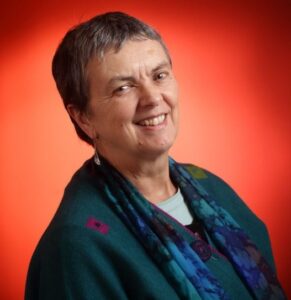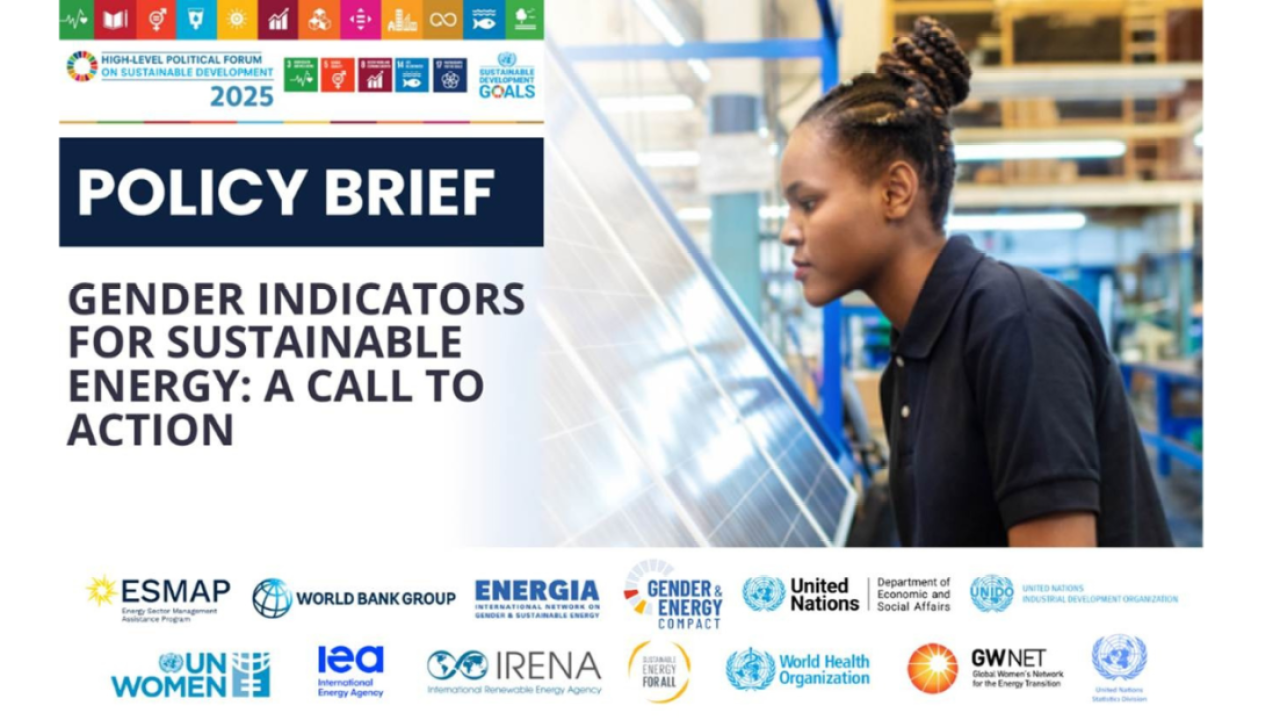 On Friday December 8, 15:00 – 16:00, Prof. dr. Clancy will hold her Farewell lecture at the Twente University. Prof. Clancy is one of the founding members of ENERGIA and has since been one of our Technical Advisors. She has been a trailblazer in research on the gender and energy nexus and her contributions to the ENERGIA network have been invaluable. We express our deepest gratitude for her genuine and continuous commitment, involvement and advise during all these years.
On Friday December 8, 15:00 – 16:00, Prof. dr. Clancy will hold her Farewell lecture at the Twente University. Prof. Clancy is one of the founding members of ENERGIA and has since been one of our Technical Advisors. She has been a trailblazer in research on the gender and energy nexus and her contributions to the ENERGIA network have been invaluable. We express our deepest gratitude for her genuine and continuous commitment, involvement and advise during all these years.
Preceding Prof. Clancy’s Farewell lecture:
Gender and Energy Research Symposium:
Were are we now? Where do we want to go? How do we get there?
Thursday 7 10:00 – Friday 8 December 14:30
The transition to a low carbon society is a complex socio-technical problem involving multiple social actors with multiple perspectives and decision-making paths which in turn are dependent on situation and context. No single discipline working alone can provide the answers to such a complex problem. Instead, a trans-disciplinary approach, together with critical knowledge frames, would provide a more holistic understanding of and identification of solutions to a more socially just energy transition.
During the Symposium we will review what we have learned so far from the gender and energy discourses in the Global South and the Global North. We will point to key successes and examples of good practice that have led to gender and social equality, as well as to try to identify gaps in knowledge and emerging themes for future research. We will explore how we can decolonize energy transitions research by learning from the emerging energy epistemologies in the Global South.
This symposium is an occasion to celebrate Joy’s contributions to gender and energy research, her pioneering work has significantly shaped the discourse. She holds the first University Chair dedicated to energy and gender. Her leadership has inspired a generation of scholars to adopt a holistic and socially just approach. This symposium stands as a testament to her enduring legacy, providing an opportunity to reflect on the path she has paved and to chart the course for a future where energy research continues to be a force for gender justice and transformative social change.
THURSDAY 7TH DECEMBER 2023
10:00 Registration with Coffee
11:15-11:30 Welcome Professor Joy Clancy
11:30-13:00 Session 1 – Gender and Energy in the North: Looking back and moving forward
Chair: Nthabi Mohlakoana (TU Delft, NL)
- Mapping Data and Indicators in the EU Clean Energy Transition and Gender Equality Nexus: Identifying Gaps and Opportunities.
Ioanna-Mirto Chatzigeorgiou, Anastasia Stefanidi and Georgios T. Andreou (Aristotle University of Thessaloniki (AUTH), Greece) - Fit for Purpose? European Green Deal advancing Gender Equality
Joy Clancy (Emeritus Professor Energy and Gender, CSTM, University of Twente), Kavya Michael (Chalmers University of Technology, Gothenburg, Sweden) and Irina Kustova (Centre for European Policy Studies, Brussels, Belgium) - Risks and Opportunities for Programming Supporting Coal Energy Transitions in Bosnia and Herzegovina
Laura Del Duca (Stockholm Environment Institute (SEI), Stockholm, Sweden) - Ecofeminist contributions to research on energy politics in the Global North
Anders Melin (Associate Professor) and Gunnhildur Lily Magnusdottir (Associate Professor) Dep. of Global Political Studies, Malmö University, Sweden - Place-based approaches and gender within energy transitions: a critical perspective
Giulia M Mininni (University of Naples Federico II, Naples, Italy) and Ralitsa Hiteva (University of Sussex, Brighton, UK)
13:00-14:00 Lunch
14:00 – 15:30 Session 2 – Energy and Women’s empowerment
Session Chair: Kavya Michel (Chalmers University, Sweden)
Keynote Address and Discussant: Amanda Elan (Babson College, US): Business perspective on Gender and Energy: Lessons Learned in ENERGIA Collaborations.
- Gender stereotypes and empowerment of women in energy cooperatives: A case study from Italy and Flanders.
Elena De Gioannis (Department of Social and Political Sciences, Università degli Studi di Milano, Milan, Italy), Aurore Dudka (Department of Sociology, Università di Trento, Trento, Italy), and Zofia Łapniewska (Department of Economics and Innovation, Jagiellonian University, Krakow, Poland) - Energy transition and the gender considerations of the workforce transformation. A critical review of the Dutch case.
Anouk Creusen and Marielle Feenstra (75inQ, The Hague, The Netherlands) - Inclusive involvement in energy communities? The role of gender, income, education, and age
Fleur Goedkoop, Lise Jans and Goda Perlaviciute (University of Groningen, Groningen, The Netherlands) with Karen R.S. Hamann (University Leipzig, Leipzig, Germany) - Gender and Just Transition Discourse in India; Can Energy Transition Transform Women’s Status and Role in Coal Economies?
Suravee Nayak and Ashwini K Swain (Centre for Policy Research, New Delhi, India) - Women in the energy sector: context, patriarchy and intersectionality
Natalia Rocha Lawton, Assistant Professor in HR&OB, Coventry University, UK and Cynthia Forson, Director External Engagement – West Africa (Lancaster University UK) and Associate Professor & Deputy Provost (Lancaster University Ghana)
15:30- 16:00 Coffee and Tea
16:00 – 17:00 (in person only) The Thing from the Future: A creative journey imagining a gender-just energy transition
Lillian Sol Cueva, International Institute of Social Studies, Erasmus University, The Hague, The Netherlands
FRIDAY 8TH DECEMBER 2023
09:00-10:00 Session 3 – What are the benefits of promoting interdisciplinary gender and energy research?
Facilitator:Joy Clancy (CSTM-UT)
- Ewert Aukes (Section Governance and Technology for Sustainability; faculty of Behavioural, Management, and Social Sciences; University of Twente, Enschede, The Netherlands)
- Athanasios Votsis (Section Governance and Technology for Sustainability; faculty of Behavioural, Management, and Social Sciences; University of Twente, Enschede, The Netherlands)
- Martin Hultman (Chalmers University of Technology, Gothenburg, Sweden)
- Anna Åberg (Chalmers University of Technology, Gothenburg, Sweden)
- Martin Stienstra (Faculty of Behavioural, Management, and Social Sciences; University of Twente, Enschede, The Netherlands)
10:00- 10:30 Coffee
10:30 – 12:00 Session 4 – Gender and energy in the South: Looking back and moving forward
Session Chair: Maria van Veldhuizen (GWNET)
- Gender Considerations in Energy Conservation: The Role of Gender and Energy Network, Ghana
Sabina Anokye Mensah and Kwame Asamoah-Topen (Gender and Energy Network (Ghana), Tema, Ghana) - Mainstreaming gender in energy innovation dissemination for urban informal settlement households in Kenya: A case study of Mathare Valley.
Christer Anditi (School of Public Leadership, Stellenbosch University, South Africa), Zwelinzima Ndevu (Department of Design, Brunel University London, UK), Fabrizio Ceschin (College of Engineering, Design and Physical Sciences, Brunel University, Uxbridge, UK), Betty Mwiti (School of Art and Design, University of Nairobi, Kenya) and Peris Njoroge (Institute for Climate Change and Adaptation, University of Nairobi, Kenya) - Towards Ubuntu Feminism of Energy Transition: An Alternative Framework
Ellen Fungisai Chipango (Trilateral Chair in Transformative Innovation, the 4IR and Sustainable Development, University of Johannesburg, Johannesburg, South Africa) - Women’s agency and the role of local institutions in the rural energy system: A case study on the energy culture of biomass-dependent households in Ethiopia
Harald F. Grabher and Melanie Pichler (Institute of Social Ecology, University of Natural Resources and Life Sciences (BOKU), Vienna, Austria) and Henrike Rau (Geography Department, Ludwig-Maximilians-University (LMU), Munich, Germany) - Actors and their roles in Nepal’s energy transition
Asha Singh (Institute of Sustainable Resources, University College London, London, UK)
10:00 – 10:30 Coffee
12:00 – 13:30 Lunch
13:30 – 14:30 Session 5 – Panel: Research Meets Policy and Practice
(Joint session with the IEA Users TCP Gender and Energy Research Programme)
Panel members
Rashi Mor (Kiwa Technology; Inka Schomer (Director Distill Inclusion)
Nicole Kerkhof-Damen (Netherlands Enterprise Agency)
Facilitator: Ana Åberg (Chalmers University, Sweden and coordinator of UsersTCP Gender and Energy Use research programme)
The Symposium uses a hybrid format.
The cost of participation is as follows:
- In person: 7 December: € 100 (includes lunch); 8 December: € 100 (includes lunch)
- Online: 7 December: € 30; 8 December: € 30







